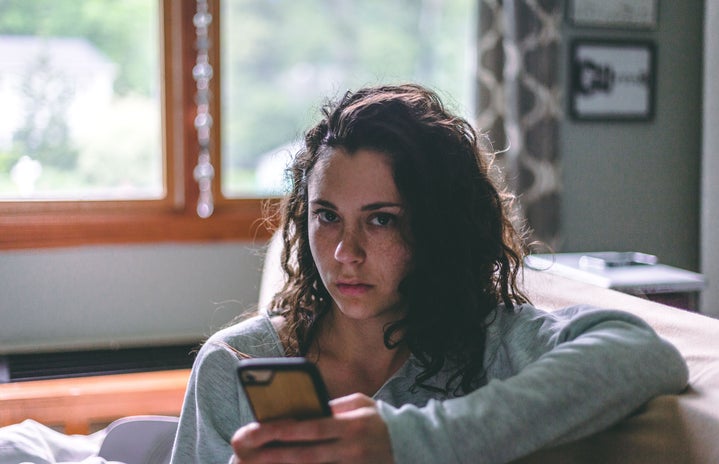It’s fair to say that the majority of us are, in some way or another, interested in pursuing healthy lifestyles. Whether this means achieving a work/ social life balance which keeps us feeling fulfilled, nourishing our bodies with the right amount of nutrients, or keeping active, most of us have goals or ideas that centre around creating a healthy lifestyle. On a basic level, seeking a healthy lifestyle is undoubtedly a positive thing, and wanting to be the best version of ourselves is, of course, not an intrinsically bad idea. The issue is, however, that all too often, spurred on by instagram fitness ‘gurus’ and the ‘That girl’ Tiktok trends, the obsession with creating a healthy lifestyle can go to such extremes that it becomes unhealthy. From intense and relentless optimism, to restrictive food rules, here are some lifestyle ‘tips’ that are best worth avoiding, alongside alternatives to help give you a more grounded perspective on health and wellbeing:
- Maintaing a ‘No bad vibes’ mantra
Having a positive outlook on life and finding joy in the small things, like listening to your favourite music, eating freshly baked bread, or buying yourself a bouquet of flowers, is a wonderful thing to aim for. There is much to be thankful for and practicing mindfulness can help us feel content, but given the very nature of our existence, it is frankly impossible to maintain a perfectly positive attitude and upbeat nature all the time. Many lifestyle pages on social media are adorned with captions and bios that read “no bad days” and “good vibes only”, and while the intention is often good, attempting to fit such a narrow ideal is not only unattainable, but also damaging. Pushing for no negativity may seem constructive, but such an ethos may prompt us to repress emotion, and subsequently make us less likely to reach out for help when we need it, in favour of ‘cheering up’.
It’s certainly true that when you learn how to appreciate smaller joys in life, you tend to be more at peace with your day-to-day experience of the world, but this message has become misconstrued, and can sometimes be delivered with a fairly unsympathetic tone, with quotes such as “You attract the energy you give off”, and “Think positively”, frequenting many Pinterest feeds. I want to remind you that if you’re stuck in a negative headspace at the moment, and don’t exactly feel as though you can, or want to ‘spread good vibes’, then this doesn’t dictate the treatment or experiences you should receive in return, and nor does it dictate your overall mental wellbeing. It’s okay to feel down, healthy even. As cliché as it may sound, you have to feel low sometimes to appreciate the highs of life, and you’re not failing, relapsing, or weakening if you find yourself succumbing to a wash of negative emotions.
Feeling blue sometimes is an unchangeable part of human nature; to try and subdue any ‘negative’ emotions is to prohibit yourself from riding out the result of normal hormonal function and a healthy social life. It’s great to want to surround yourself with optimistic people and only focus on the good in the world, but to take this to extremes, and shun any feelings of sadness or frustration is not only unsustainable but also counterproductive. If we were to truly adopt a “good vibes only” ethos, would this not mean excluding people in need of support and kindness from our circles because they don’t bring the right energy to our lives? Surely this is the opposite of everything mindfulness aims to achieve. A good life necessitates ambivalence, and sometimes it’s more helpful to admit that actually everything might not be so great at the minute. On a small scale this might mean withdrawing from any excessive plans and taking an evening for yourself to stay in bed and watch your favourite TV show, but this could also mean taking steps towards improving your mental health on a larger scale by seeking out therapy. Wherever you are & however you’re feeling, don’t let oversimplified principles make you feel guilty for experiencing normal fluctuation of human emotion: true happiness is more attainable when you can be comfortable around its inverse.
- Eating ‘clean’
The very prospect of ‘healthy’ food is not only nuanced, but highly subjective, and sometimes downright dangerous. Of course, we all know that eating heavily processed foods, laden with fat and sugar, every day, is not healthy. But, conversely, abstaining from any foods we have been conditioned to perceive as ‘bad’ or ‘junk’, in favour of ‘whole’ foods, can be just as unhealthy. Campaigns to replace what is, quite frankly, a balanced diet for most of us, with unprocessed, low-fat, low-sugar alternatives have become increasingly prevalent in recent years, as seen on TV, in print and all over social media. The foundation of this advice is solid- we should be incorporating more whole-grains, fruits and vegetables, and decent sources of protein into diets, but the superstructures that have been built upon this, which villainise certain types of foods, can be damaging. The issue that arises when we focus on eating ‘clean’, is that we begin to view certain foods as off-limits, with countless Instagram reels offering “healthy alternatives” and dupes for some of your favourite comfort foods and snacks. Not only can this make us miserable and frustrated, but if given too much holding power, such restrictive attitudes can lead to eating disorders and troubled relationships with food.
The truth is that all foods have a place in our diets within reason, and eating a slice of birthday cake or getting a kebab after the club is sometimes far more healthy than creating an aura of fear or shame around these foods, and subsequently avoiding social interactions because they don’t fit within such food rules. As long as you’re nourishing your body with the vitamins it needs, and getting a range of nutrients from all food groups, then you’re doing just fine. But if you find that you’re saying no to dinner plans with friends because there isn’t a “healthy” option, or blending bananas and ice when you’re actually really craving a bowl of Ben and Jerry’s, then it’s time to redress the balance. Its okay to opt for the healthy option if you feel you want something lighter, or you’re trying to increase your intake of vital nutrients, but don’t let the widespread notion that ‘processed=bad’ dictate your eating . Because all food is wholesome, whether it’s fulfilling and nourishing our stomachs, organs, skin & hair, tastebuds or minds. Ultimately, pay attention to your body, it knows what it needs, and if a mental hunger is there: listen to it.
- Exercising every day
I’d wager it’s fairly likely that, at one point or another, you’ve come across a social media post which has pushed a “no excuses” ethos, giving the impression that if you skip a workout, even for a day, you’ve failed. Not only is this attitude naïve and one dimensional, but also potentially dangerous. Whilst its ideal to move your body in some way every day- even if this is going for a short walk- it’s okay, even crucial, to take time to rest whenever you need it. And, yes, this is still true if this need isn’t down to a physical injury. Overworking your body not only poses a multitude of physical risks, including joint problems, stopped periods, and fatigue, but also takes a toll on your mental wellbeing. Overtraining can cause restlessness, irritability, and mood swings, as well as feelings of anxiety and guilt that arise from buying into a culture that demands an every-day approach to fitness.
Much like a fixation on ‘eating clean’, a fixation on exercise has the capacity to turn something healthy into an unhealthy obsession, through both physically pushing yourself past your limits or causing you to neglect other areas of your life due to a monomania with the gym. Exercise should be enjoyable, and so if you’re finding yourself exercising out of a feeling of necessity or guilt, then it’s time to take a step back. Allow yourself to rest when you feel burnt out, either physically or mentally. Not only is this ultimately better for any fitness goals you may be setting out, for overtraining can, in fact, cause a decline in performance, but such an attitude also helps to prevent exercise from becoming compulsive and mentally, socially or emotionally draining.
- Any programme which isn’t crafted for your own needs
The most important one really, as this encapsulates everything covered thus far & more. Indeed, perhaps the most harmful lifestyle advice you could receive is advice which has been tailored to fit someone else’s desired way of life. Of course, there’s nothing wrong with someone offering tips and support to those seeking to reach a similar state of being, and I’m by no means saying that any form of lifestyle advice is wrong or invalid. But, you should always remember, whether you’ve seen someone’s productivity schedule on Tiktok, heard a friend rave about a new meal plan, or got lost in the seemingly never ending captions on wellness influencer’s Instagram posts, that whatever works for somebody else may not necessarily be the best thing for you. There is no set way to achieve happiness or health, for these are both highly subjective and personal terms, and attempting to recreate a regime based on someone’s else’s goals and their interpretation of fulfilment is not going to nourish your soul.
Its okay to borrow techniques you feel will be beneficial, but dont use your compatibility with these techniques as an evaluation of your lifestyle. If you find that someone else’s schedule or methods aren’t working for you; drop them without guilt. You haven’t failed because the customs of another individual don’t make you happy. Crafting the best lifestyle for yourself comes with experience, trial and error, and getting to know you, so invest time into experimenting with and find what makes you feel emotionally, mentally and physically fulfilled.
In an age where extreme is the norm, remember that moderation will rarely steer you wrong. The rigid, unwavering ‘health’ plans commonly promoted on social media, and their accompanying overly-optimistic captions, can become a recipe for disaster, prompting obsession, restriction, and a high level of pressure. Instead of viewing lifestyle advice as a set of rules and ideals, we should reframe the goal as making things a little easier for ourselves. With less pushing, punishing, and pressure, and and a little more prudence, the rest will fall into place. Be kind to yourself and your body, and don’t let Instagram tell you that you’re living your life wrong.





